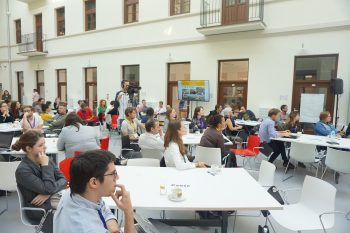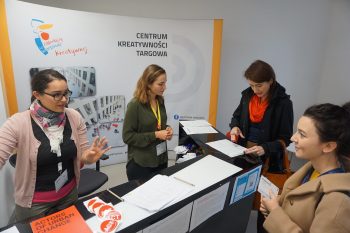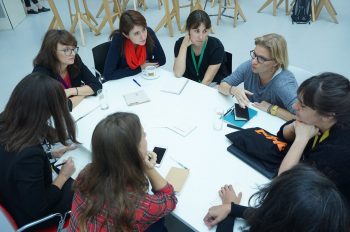The special issue of the European Journal of Homelessness with papers of members of the COST Action CA15218 “Measuring Homelessness in Europe” is online. Nóra Teller, senior expert of MRI is among the co-authors of the article “Measuring Homelessness by City Counts –Experiences from European Cities”. Read papers on migration and homelessness, hidden homelessness, making use of administrative data, and national and city counts in here.
News
Measuring Homelessness in Europe – Webinar series with participation of Nóra Teller
Webinar Series on Measuring Homelessness in Europe, a public event series organised by COST action CA15218, covering 24 COST member states has just been announced. The webinars summarise the scientific achievements of a 4-year international cooperation about methods, challenges, and results relating to measuring homelessness.
- 1st webinar (February 25, 2021) National and Local Counts
- 2nd webinar (March 4, 2021) Dynamics and Time
- 3rd webinar (March 11 2021) Ethical Issues
For any queries, please visit the website of the webinar or contact Nóra Teller at teller@mri.hu
UPLIFT Project- Two New Deliverables are Available
At the end of December, the UPLIFT team (the project of which is coordinated by MRI) has submitted two essential deliverables on socio-economic inequalities in Europe. The main aim of the deliverables was to create a theoretical framework for analysing urban inequalities with the main focus of the younger generation (aged 15-29).
The Atlas of Inequalities (Deliverable 1.3) summarizes the main social inequality tendencies in Europe, with a special focus on the urban young adults. The analysis was carried out for the years 2007/2008; 2012 and 2018, which provide us information about inequalities just before and shortly after the economic crisis and then the latest data enables us to see how countries recovered from the crisis with regard to socio-economic inequalities. For the analysis the EU Study on income and Living Conditions (EU-SILC) and Labour Force Survey (EU-LFS) were used. Besides analysing the indicators on the national level, the analysis was carried out on NUTS1 or NUTS2 regions, where data was available.
The Framework Study on Inequalities (Deliverable 1.4) identifies and shortly describes the drivers of inequalities in the context they occur: different governance levels, in different domains (housing, employment, education). In addition an urban typology was created based on the potential linkage of social cohesion (measured by a complex equity index and a labour market exclusion index) and economic competitiveness (measured by innovation index, productivity, globalization and population change). The Metropolitan Areas database was used for this analysis, providing comparable data for the years of 2017/2018 in 110 metropolitan areas.
Please find the studies here:
‘Never let a good crisis go to waste’ – urban lessons learnt from the pandemic (photo essay from Iván Tosics)
In his traditional New Years’ photo-essay Iván Tosics writes about urban reactions on the pandemic. How did cities act with emergency measures in the spring and what could they preserve from their progressive interventions by late summer, when life seemed to go back to ’normal’?
’Never let a good crisis go to waste’ – this famous sentence is thought to be said by Winston Churchill. If we accept that a crisis is a good opportunity to make changes, cities should address those aspects of urban life which were drastically wrong and contributed to the crisis. How are cities doing that and what are the conditions for long lasting results – this is what Iván writes about, illustrating the story with many photos.
The photo-essay is available here.
‘Cities against the pandemic’ by Iván Tosics
In the COVID 19 crisis cities are key stakeholders fighting for environmental and social sustainability. Their contribution to tackling the present crisis could serve as a blueprint for future social policies that take into consideration social justice and the green economy. In many countries, cities are the last bastion of progressive social policies. It is therefore essential that we learn from the mistakes of the past and avoid a renewed wave of austerity against municipal budgets. In this paper, concrete examples are given of the vital role local governments play in the fight against the pandemic.
Critical Housing Analysis: Issue 2020/1 released – edited by József Hegedüs
The special issue “Varieties of Housing Regime Approaches” edited by József Hegedüs aims to discuss different theoretical concepts and their empirical relevance. It represents a unique collection of seven papers written by leading housing researchers in this field.
‘Urban poverty and the pandemic’ in URBACT by Iván Tosics
Iván Tosics has published an article in URBACT website on raising the importance of local solutions for the social and economic affects of the Covid-19 crisis that is hitting the poorest. Tosics explores in this article what URBACT’s role could be on finding local solutions.
The full article is available in English on this link.
A new H2020 Project, coordinated by MRI, was just kicked-off in Budapest
UPLIFT project – “Urban PoLicy Innovation to address inequality with and for Future generaTions” (2020-2022) coordinated by MRI – has successfully launched on 28-29 January in a kick-off meeting organized in Budapest.
The UPLIFT project aims to understand the main drivers of urban socio-economic and spatial inequalities focusing mainly on the younger generation (15-29) in the post-crisis area. The analysis will be done on four levels: (1) understanding the relation between socio-economic inequalities and spatial inequalities on European level, (2) understanding how local policies are able to influence urban inequalities in a sample of 16 functional urban areas, (3) analysing by means of interviews with vulnerable young and policy experts how local policies are in interaction with household decisions in 8 cities. As a result of all these analyses, UPLIFT will create – with the active involvement of vulnerable youth – local Reflexive Policy Agendas: new local policies that are more sensitive to the changing needs of the target group. This co-creation process will be carried out in 4 locations: Amsterdam (NL), Barakaldo (ES), Sfântu Gheorghe (RO), and Tallinn (EE).
7th Informed Cities conference: Who profits from heritage?
OpenHeritage project, led by Metropolitan Research Institute, organized its first international event in Warsaw in October 2019, in the framework of the Informed Cities Forum series, in cooperation with ICLEI – Local Governments for Sustainability, and the Actors of Urban Change network.

The 7th Informed Cities forum was a two-day event called “Who profits from heritage? Communities, capital and urban space”. It took place on 15-16 October, and explored the interrelation between urban regeneration and heritage, reflecting on the importance of community involvement and the creation of a heritage community. The latter is a crucial building block of all successful projects. As Katarzyna Sadowy of OpenHeritage partner Warsaw Association of Polish Architects (OW SARP) pointed out in her keynote speech, “heritage doesn’t exist without the heritage community – people who make the buildings, places, stories part of their identity”.
Building on the experience of the OpenHeritage project and the Actors of Urban Change community, the Forum explored new ideas and tools to empower local communities and safeguard urban commons. The realities, challenges and successes of urban regeneration were illustrated through a series of field workshops organised by local partners representing the public, private and community sectors in Warsaw. The workshops explored community-managed spaces; partnerships for creative districts; the future of urban peripheries; mapping values using heritage; and modern placemaking.
The event gathered more than 100 participants, who were a mix of urban activists, social entrepreneurs, local and European policy makers, researchers and investors.




HomeLab: closing conference in Budapest
Te closing conference of HomeLab – Integrated Housing and Labour Services in the Social Rental Enterprise model – will take place on 26-27 September 2019, in European Youth Centre Budapest.
HomeLab was launched in 2016, and aimed at providing integrated social, housing and employment services to vulnerable, often multiply excluded target populations in the four “Visegrad” countries (Czechia, Hungary, Poland, and Slovakia). The closing conference, final event of a three year experimental and research project, assesses the difficultues and achievements of both the pilot projects, and the research stream of HomeLab, looking in particular at the promises and challenges of integrated service provision to excluded socio-economic groups. In the sessions from Thursday morning until Friday early afternoon discussants will look at innovations in housing and employment support, in social accompaniment strengths and deficiencies in the Central and Eastern European context, and on the ways in which integrated support measures may fold out in a mutually supporting manner.
The full programme is available on this link.
MRI 2019 conference and call: Urban and Housing Systems under Pressure
Urban planning and the aftermath of the crisis: Iván Tosics in Urbanisme
The global crisis and recession created a new situation for urban financing. Severe changes in economic and financial conditions extorted the revision of existing public policies. Under the worsening financial conditions, the traditional functioning of cities collapsed – writes MRI director Iván Tosics in the special issue of Urbanisme, focusing on the URBACT programme.